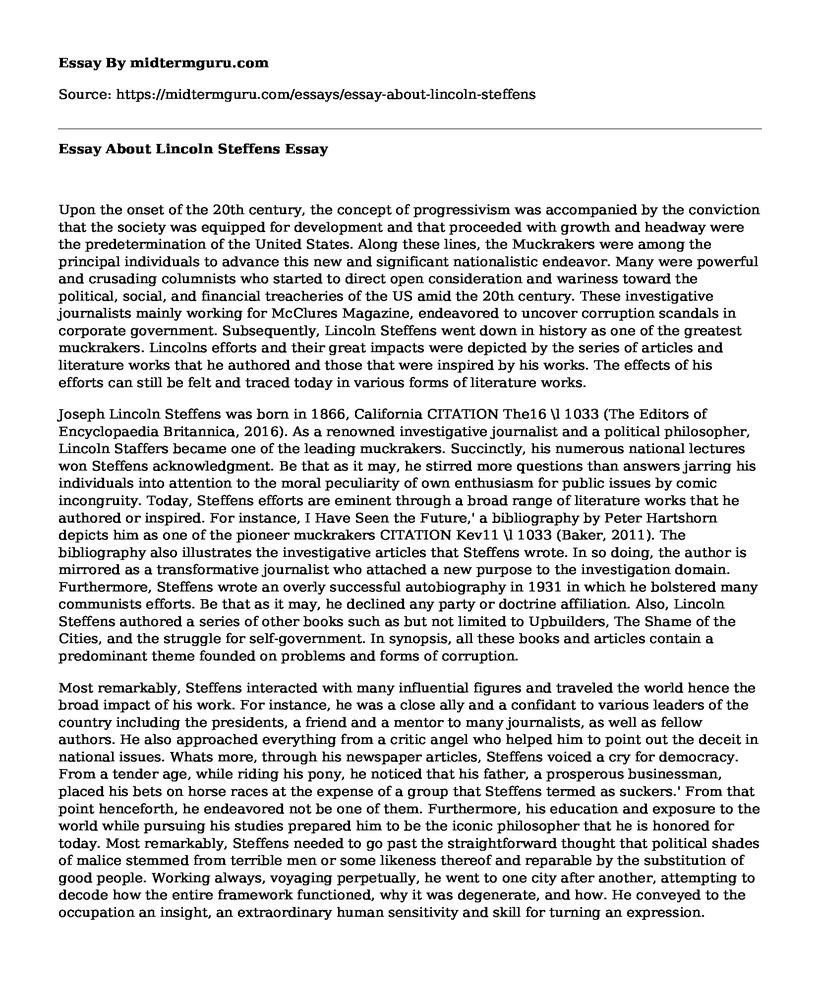Upon the onset of the 20th century, the concept of progressivism was accompanied by the conviction that the society was equipped for development and that proceeded with growth and headway were the predetermination of the United States. Along these lines, the Muckrakers were among the principal individuals to advance this new and significant nationalistic endeavor. Many were powerful and crusading columnists who started to direct open consideration and wariness toward the political, social, and financial treacheries of the US amid the 20th century. These investigative journalists mainly working for McClures Magazine, endeavored to uncover corruption scandals in corporate government. Subsequently, Lincoln Steffens went down in history as one of the greatest muckrakers. Lincolns efforts and their great impacts were depicted by the series of articles and literature works that he authored and those that were inspired by his works. The effects of his efforts can still be felt and traced today in various forms of literature works.
Joseph Lincoln Steffens was born in 1866, California CITATION The16 \l 1033 (The Editors of Encyclopaedia Britannica, 2016). As a renowned investigative journalist and a political philosopher, Lincoln Staffers became one of the leading muckrakers. Succinctly, his numerous national lectures won Steffens acknowledgment. Be that as it may, he stirred more questions than answers jarring his individuals into attention to the moral peculiarity of own enthusiasm for public issues by comic incongruity. Today, Steffens efforts are eminent through a broad range of literature works that he authored or inspired. For instance, I Have Seen the Future,' a bibliography by Peter Hartshorn depicts him as one of the pioneer muckrakers CITATION Kev11 \l 1033 (Baker, 2011). The bibliography also illustrates the investigative articles that Steffens wrote. In so doing, the author is mirrored as a transformative journalist who attached a new purpose to the investigation domain. Furthermore, Steffens wrote an overly successful autobiography in 1931 in which he bolstered many communists efforts. Be that as it may, he declined any party or doctrine affiliation. Also, Lincoln Steffens authored a series of other books such as but not limited to Upbuilders, The Shame of the Cities, and the struggle for self-government. In synopsis, all these books and articles contain a predominant theme founded on problems and forms of corruption.
Most remarkably, Steffens interacted with many influential figures and traveled the world hence the broad impact of his work. For instance, he was a close ally and a confidant to various leaders of the country including the presidents, a friend and a mentor to many journalists, as well as fellow authors. He also approached everything from a critic angel who helped him to point out the deceit in national issues. Whats more, through his newspaper articles, Steffens voiced a cry for democracy. From a tender age, while riding his pony, he noticed that his father, a prosperous businessman, placed his bets on horse races at the expense of a group that Steffens termed as suckers.' From that point henceforth, he endeavored not be one of them. Furthermore, his education and exposure to the world while pursuing his studies prepared him to be the iconic philosopher that he is honored for today. Most remarkably, Steffens needed to go past the straightforward thought that political shades of malice stemmed from terrible men or some likeness thereof and reparable by the substitution of good people. Working always, voyaging perpetually, he went to one city after another, attempting to decode how the entire framework functioned, why it was degenerate, and how. He conveyed to the occupation an insight, an extraordinary human sensitivity and skill for turning an expression.
References
BIBLIOGRAPHY Baker, K. (2011, May 13). Lincoln Steffens: Muckrakers Progress. Retrieved from New York Times: http://www.nytimes.com/2011/05/15/books/review/lincoln-steffens-muckrakers-progress.html.
The Editors of Encyclopaedia Britannica. (2016, December 9). Lincoln Steffens. Retrieved from Encyclopaedia Britannica: https://www.britannica.com/biography/Lincoln-Steffens.
Cite this page
Essay About Lincoln Steffens. (2021, Jun 01). Retrieved from https://midtermguru.com/essays/essay-about-lincoln-steffens
If you are the original author of this essay and no longer wish to have it published on the midtermguru.com website, please click below to request its removal:
- Problem Solution Essay on Social Media Addiction
- The Relationship Between Gilgamesh and Enkidu - Research Paper
- Essay Sample on Tintoretto's 'Last Supper'
- Music: A Journey From Africa to Humanity's Soul - Essay Sample
- Romanticism in Art: Expressing Emotions Through Colors - Essay Sample
- Movie Analysis Essay on the Lego Movie 2: Building a World
- Gatsby's Secret Letter - Essay Sample







